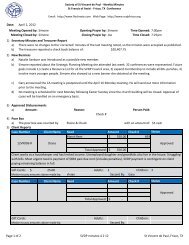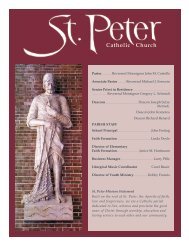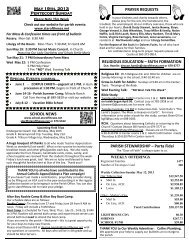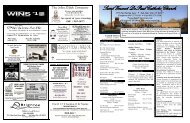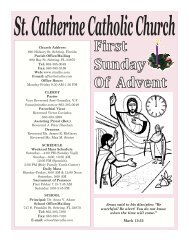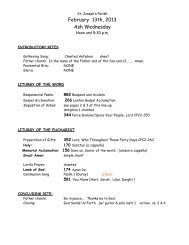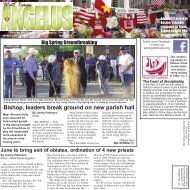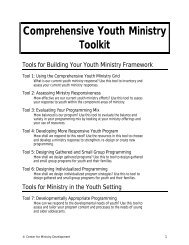Sept 4 2011 23rd S OT.pdf - Flocknote
Sept 4 2011 23rd S OT.pdf - Flocknote
Sept 4 2011 23rd S OT.pdf - Flocknote
Create successful ePaper yourself
Turn your PDF publications into a flip-book with our unique Google optimized e-Paper software.
Saint Thomas More<br />
The Catholic Chapel & Center at Yale University<br />
Sunday, <strong>Sept</strong>ember 4, <strong>2011</strong><br />
Twenty-third Sunday in Ordinary Time<br />
Chaplaincy & Pastoral Team<br />
Rev. Robert Beloin, PhD., Chaplain<br />
Kathleen Byrnes, Assistant Chaplain<br />
Rev. Eddie DeLeón, CMF, Assistant Chaplain<br />
Curtis Beavers, Facilities Staff<br />
Kimberly Buckley, Finance Assistant<br />
Jamie Cappetta, Director of Program & Development<br />
Karolyn Dunn, Finance Administrator<br />
Frank Finkle, Facilities Manager<br />
Michael Flora, Director of Administration & Finance<br />
Richard Gard, '07 DMA, Director of Music<br />
Louis Plagesse, Facilities Staff<br />
Vicki Plagesse, Facilities Staff<br />
Michelle Towster, Pastoral Intern<br />
Rebecca Trujillo, Administrative Assistant/Development<br />
Register at STM with flockNote<br />
Don’t forget to register with us on flockNote! Sign up to receive weekly<br />
emails, invitations and the bulletin each week electronically. You can<br />
select email, text message, Twitter, Facebook & more. Log on to the<br />
STM website and click on the flockNote button on the lower right<br />
corner to begin. For more information, katie.byrnes@yale.edu.<br />
Calendar & Daily Readings<br />
Members of the community are encouraged to use the Scriptural readings in their daily prayer. The Sacrament of Reconciliation will<br />
take place on the first Wednesday of the month from 5:30 pm — 6:30 pm or by appointment.<br />
Monday<br />
<strong>Sept</strong>ember 5<br />
Tuesday<br />
<strong>Sept</strong>ember 6<br />
Wednesday<br />
<strong>Sept</strong>ember 7<br />
Thursday<br />
<strong>Sept</strong>ember 8<br />
Friday<br />
<strong>Sept</strong>ember 9<br />
Saturday<br />
<strong>Sept</strong>ember 10<br />
Sunday<br />
<strong>Sept</strong>ember 11<br />
Weekday<br />
Private Prayer: Col 1:24-2:3; Ps 62:6-7, 9; Lk 6:6-11<br />
Weekday<br />
5:00 pm Eucharist: Col 2:6-15; Ps 145:1-2, 8-11; Lk 6:12-19<br />
5:30 pm — 6:30 pm: Sacrament of Reconciliation; 10:00 pm: Night Prayer<br />
Weekday<br />
5:00 pm Eucharist: Col 3:1-11; Ps 145:2-3, 10-13; Lk 6:20-26<br />
The Nativity of the Blessed Virgin Mary<br />
5:00 pm Eucharist: Mi 5:1-4a; Ps 13:6; Mt 1:18-23<br />
Peter Claver, Priest<br />
5:00 pm Eucharist: 1 Tm 1:1-2, 12-14; Ps 16:1-2, 5, 7-8, 11; Lk 6:39-42<br />
Weekday<br />
Private Prayer: 1 Tm 1:15-17; Ps 113:1-7; Lk 6:43-49<br />
268 Park Street w New Haven w CT 06511-4714<br />
phone: 203-777-5537 w fax: 203-777-0144<br />
e-mail: stmchapel@yale.edu w website: www.stm.yale.edu<br />
robert.beloin@yale.edu, katie.byrnes@yale.edu, eddie.deleon@yale.edu<br />
Undergraduate Student Council<br />
Emily Gray MC '13, Co-Chairperson<br />
Matthew Dernbach TC '13, Co-Chairperson<br />
Peter Wilczynski CC '12, Publicity Co-Chairperson<br />
Sophia Yoo SY '13, Publicity Co-Chairperson<br />
Travis Heine PC '14 , Social Justice Co-Chairperson<br />
Michael Protacio TD '13, Social Justice Co-Chairperson<br />
Amymarie Bartholomew DC '13, Liturgy & Spirituality Co-Chairperson<br />
David Suwondo BK '13, Liturgy & Spirituality Co-Chairperson<br />
Caroline Dewing SM '12, Social Activities Co-Chairperson<br />
Patrick Pitoniak TC '12, Social Activities Co-Chairperson<br />
Jeff Marrs TC '13, Program Committee Representative<br />
Kyle Wittenauer TC '14, Student Outreach Co-Chairperson<br />
Katie Levandoski BK '13, Student Outreach Co-Chairperson<br />
Katie Fruin BK '13, Secretary/Treasurer<br />
Graduate Student Council<br />
Christian Burset, Elizabeth Calle, Anthony Domestico, Megan<br />
Eckerle, Meagan Fitzpatrick, Craig Ford, Conor Frailey, Karen<br />
Paczkowski, Christopher Thissen, Anna Trofka and Peter<br />
Verovsek<br />
Twenty-fourth Sunday in Ordinary Time<br />
10:00 am, 5:00 pm & 10:00 pm Eucharist:<br />
Sir 27:30-28;9; Ps 103:1-4, 9-12; Rom 14:7-9; Mt 18:21-35
Graduate Student<br />
Wine & Cheese Reception<br />
Come and reconnect<br />
with or<br />
meet other<br />
Catholic Graduate Students!<br />
Thursday, <strong>Sept</strong>ember 8 th<br />
5:30 pm w courtyard<br />
Student Retreat<br />
“The Art of Forgiveness”<br />
Relax, recharge<br />
&<br />
meet fellow Catholic Yalies!<br />
Saturday, <strong>Sept</strong>ember 10 th<br />
from 10:00 am—6:00 pm<br />
The Thomas E. Jr, Golden Center<br />
“Sundaes on Monday”<br />
FROSH ONLY!<br />
Ice Cream Treat<br />
&<br />
meet STM Leaders!<br />
Monday, <strong>Sept</strong>ember 12 th<br />
8:00 pm w courtyard<br />
Meet the Chaplains: The Chaplain and Assistant Chaplains are available to meet students anytime by appointment. Call the<br />
office or send them an email: Fr. Bob: ext. 101, robert.beloin@yale.edu, Katie: ext. 103, katie.byrnes@yale.edu, or Fr. Eddie:<br />
ext. 102, eddie.deleon@yale.edu or just stop in if you see their office doors open.<br />
Catholic Art at Yale: An Afternoon at the Gallery: All students are invited on Sunday, <strong>Sept</strong>ember 18 th for an exclusive tour<br />
and discussion of ten Christian works of art with a Yale Art Gallery curator. This partnership between STM and the YAG will<br />
challenge participants to reflect upon the intersection of faith and art as it relates to the artist and the time period. Join us for this<br />
rare opportunity and check out one of the most prestigious galleries in the world! Group departs from the courtyard at 2:00 pm<br />
and will return by 4:30 pm. To reserve your spot or for more information: katie.byrnes@yale.edu.<br />
Eucharistic Ministers, Lectors and Acolytes: Interested in becoming more involved in the ministry of the community? Consider<br />
becoming a Eucharistic Minister, Lector or an Acolyte. Participation in these ministries requires just an extra few minutes a<br />
week. Training sessions for new Eucharistic Ministers and Acolytes will be held after all Masses on Sunday, <strong>Sept</strong>ember 18 th .<br />
Lector training will be held at 3:30 pm on Sunday, <strong>Sept</strong>ember 18 th . For more information: katie.byrnes@yale.edu.<br />
Catholic Faculty Series “Life as a Scholar and a Believer”: Everyone is invited to a dinner discussion with Richard Gard, Director<br />
of Music on Sunday, <strong>Sept</strong>ember 18 th at 6:00 pm in the dining hall. Richard Gard joined Saint Thomas More Chapel in 2000.<br />
In 2003 he was appointed to the faculty at the Yale School of Music where he teaches musicianship, analysis, and improvisation<br />
and serves as a Graduate Advisor. Concurrently, he is Professor of Music and Chair of the Department of the Arts at Naugatuck<br />
Valley Community College. This is an excellent opportunity to hear the personal reflections of a Catholic faculty member. Dinner<br />
will be served.<br />
Small Church Communities (SCC): Small Church Communities offer an experience of Church in small groups, focusing on<br />
bible study, faith formation, friendship and service. By learning how to read Scripture as a Catholic Christian and apply it to your<br />
life, you have the opportunity to develop a mature adult faith during your time at Yale. Sign-up on Sunday, <strong>Sept</strong>ember 18 th . The<br />
opening dinner will be take place on Sunday, <strong>Sept</strong>ember 25 th at 6:00 pm in the dining hall, providing an opportunity to meet<br />
your group before the sessions start during the week of Monday, <strong>Sept</strong>ember 26 th . For more information: katie.byrnes@yale.edu.<br />
Volunteers needed: Interested in helping out with the liturgical life here at STM? Volunteers are needed to help with laundering<br />
the linens used during liturgies. If interested, contact katie.byrnes@yale.edu.<br />
Religious Education for Kids Registration: We will begin our 7 th year of offering religious instruction for children on Sunday,<br />
October 2 nd . Classes meet Sundays during the academic year. Families are invited to register on Sunday, <strong>Sept</strong>ember 25 th . For<br />
more information: katie.byrnes@yale.edu.<br />
Teachers needed: All undergraduate and graduate students are invited to teach the youngest members of our community.<br />
Classes begin on Sunday, October 2 nd and meet Sunday mornings for 50 minutes during the regular academic term. In most<br />
cases there are two teachers per age group and all materials are supplied. Consider this exciting opportunity to work with<br />
kids!Training will take place on Sunday, <strong>Sept</strong>ember 25 th . For more information: katie.byrnes@yale.edu.<br />
Become a member of the choir: The Saint Thomas More Chapel Choir is one of the most inspiring ensembles at Yale, featuring<br />
concert performances as well as Sunday choral, instrumental, and solo liturgical music. Weekly rehearsals are 45 minutes before<br />
each Mass. Instrumentalists and singers are invited to join. For more information: richard.gard@yale.edu.
*For the next 9 weeks, articles on the new Missal translation will appear here to help prepare us Xfor Advent <strong>2011</strong>.*<br />
XXX Celebrating the Lord’s Day<br />
THE SUNDAY EUCHARIST<br />
The primary way in which we celebrate the Lord’s Day is with our participation in the Sunday Eucharist. This<br />
celebration is not a solitary, private event. Instead, we come together as the People of God, the Church, to worship with one<br />
heart and one voice. The Catechism of the Catholic Church (CCC) teaches that “participation in the communal celebration<br />
of the Sunday Eucharist is a testimony of belonging and of being faithful to Christ and to His Church” (CCC, no. 2182).<br />
We should arrive on time, prepared in mind and heart to fully participate in the Mass. Those who cannot attend<br />
because of illness or the need to care for infants or the sick deserve our prayers and special attention. Often, people will<br />
suggest that going to Sunday Mass is not necessary. After all, they can pray at home just as well. This has clearly<br />
been an issue in the Church for more than a millennium. In the fourth century, St. John Chrysostom addressed this<br />
problem directly:<br />
You cannot pray at home as at church, where there is a great multitude, where exclamations are cried out<br />
to God as from one great heart, and where there is something more: the union of minds, the accord of<br />
souls, the bond of charity, the prayers of the priests. (CCC, no. 2179, quoting St. John Chrysostom, De<br />
incomprehensibili 3, 6: PG 48, 725)<br />
Private prayer, though essential to the spiritual life, can never replace the celebration of the eucharistic Liturgy and<br />
the reception of Holy Communion.<br />
KEEPING SUNDAY—ALL DAY<br />
Celebrating the Sunday Eucharist—though central and essential—does not complete our observance of Sunday. In<br />
addition to attending Mass each Sunday, we should also refrain “from those activities which impede the worship of God<br />
and disturb the joy proper to the day of the Lord or the necessary relaxation of mind and body”(Compendium of the<br />
Catechism of the Catholic Church, no. 453).<br />
Sunday has traditionally been a day of rest. However, the concept of a day of rest may seem odd in a world that runs<br />
24/7, where we are tethered to our work by a variety of electronic gadgets, where businesses run as normal no matter what<br />
the day of the week, and where silence seems to be an endangered species. By taking a day each week to rest in the Lord,<br />
we provide a living example to the culture that all time belongs to God and that people are more important than things.<br />
As Pope John Paul II said in Dies Domini (The Day of the Lord), his apostolic letter on Sunday:<br />
Through Sunday rest, daily concerns and tasks can find their proper perspective: the material things about<br />
which we worry give way to spiritual values; in a moment of encounter and less pressured exchange, we see<br />
the true face of the people with whom we live. Even the beauties of nature—too often marred by the desire to<br />
exploit, which turns against man himself—can be rediscovered and enjoyed to the full. (Dies Domini, no. 67)<br />
Not everyone has the freedom to take Sundays away from work.<br />
Resting on Sunday does not mean that we are inactive. Instead,<br />
Sunday is traditionally consecrated by Christian piety to good works and humble service of the sick, the<br />
infirm, and the elderly. Christians will also sanctify Sunday by devoting time and care to their families and<br />
relatives, often difficult to do on other days of the week. Sunday is a time for reflection, silence, cultivation<br />
of the mind, and meditation which furthers the growth of the Christian interior life. (CCC, no. 2186)<br />
To celebrate the Lord’s Day more fully, consider trying the following:<br />
w Go for a walk or bike ride and give thanks to God for the beauty of nature.<br />
w Spend time reading the Bible or a spiritual book.<br />
w Pray the Rosary or the Liturgy of the Hours, alone or with others.<br />
w Turn off your gadgets and enjoy the silence.<br />
As we take time each week to celebrate the Paschal Mystery in the Eucharist and to rest from the burdens of our daily<br />
lives, we remind ourselves that we are made in the image and likeness of God who “rested on the seventh day from all the<br />
work he had undertaken” (Gn 2:2).<br />
REFERENCES<br />
“Copyright © 2010 United States Conference of Catholic Bishops, Washington, D.C. Used with permission. All rights reserved.”
The Word of the Lord—Twenty-fourth Sunday in Ordinary Time —<strong>Sept</strong>ember 11, <strong>2011</strong><br />
Try to develop the habit of preparing the texts each week before coming to Mass. Becoming more familiar with the text during<br />
the week, you can prayerfully prepare for next Sunday’s Mass and more readily enter into the spirit of the celebration.<br />
First Reading<br />
Sirach 27:30—28;9<br />
Today’s reading is part of a lengthier passage in Sirach<br />
that describes how deceit, mistrust, betrayal, and suspicion<br />
can destroy a friendship and do lasting harm to the friends.<br />
Some scholars suggest that the passage refers to the story of<br />
Esther, to Haman’s plot to kill Mordecai. Haman had been<br />
promoted to a high rank and Mordecai had refused to pay<br />
him homage. Then Haman refused to forgive Mordecai, the<br />
tables turned on Haman and he suffered death because of<br />
his own wrath.<br />
Paired with today’s Gospel because of the theme of<br />
forgiveness, this reading argues that forgiveness of a<br />
neighbor’s injustice comes first; after forgiving one’s<br />
neighbor, in prayer, one can ask for the forgiveness of one’s<br />
own sins. The rhetorical questions which follow this teaching<br />
serve to reinforce the point that anger and resentment toward<br />
others must give way to mercy.<br />
The final verses of the reading teach us that the decision<br />
to forgive one’s neighbor rather than continue to be angry<br />
is best made while thinking about the end of one’s life and<br />
one’s decision to follow the commandments.<br />
Second Reading<br />
Romans 14:7—9<br />
This is the last Sunday of twelve counted Sundays<br />
in Ordinary Time in which the Second Reading is from<br />
Romans. This Sunday’s Second Reading, like last Sunday’s,<br />
comes from the hortatory or catechetical section of Romans<br />
in which Paul teaches about what it means to live in Christ.<br />
In last Sunday’s passage, Paul made the point that all the<br />
commandments are summed up in the saying “Love your<br />
neighbor as yourself.” Recall also that Paul understood<br />
Jesus as the fulfillment 01 the commandments. In today’s<br />
brief passage, Paul puts forward what could be considered<br />
the basics of love. The love of Christians for one another is<br />
founded on the Lord who lived, died, and rose for them. All<br />
that we do—our living and our dying—is done “for the Lord.”<br />
Controversies around whether or not to eat meat, observe<br />
certain festivals, and follow dietary laws of the Mosaic code<br />
form the backdrop to Paul’s call for unity in the Lord. These<br />
controversies, like some today, can be understood generally<br />
as disagreements between those who wanted to hold onto<br />
the details of the law and those who wanted to maintain the<br />
spirit of the law.<br />
Whatever the decision on the observance of particular<br />
components of the law, for Paul, the community must decide<br />
based on its life in the Lord. All our decisions, for Paul, must<br />
be guided by selflessness and love, the definition of living<br />
and dying in the Lord.<br />
Gospel<br />
Matthew 18:21—35<br />
Today’s Gospel begins with Peter’s question to Jesus<br />
about how often he must forgive a brother who sins against<br />
him. Perhaps Peter is hoping Jesus will say that Peter would<br />
need to forgive no more than seven times. Unexpectedly<br />
and to Peter’s dismay, Jesus responds that Peter must offer<br />
forgiveness 71 times, a number that symbolizes forgiveness<br />
without end. To illustrate this forgiveness, Jesus tells the<br />
parable of the unforgiving servant.<br />
This parable has three scenes. In the first, the emphasis<br />
is on the king’s compassion toward the debtor who owed<br />
him a large amount of money—literally 10,000 talents.<br />
The king’s offer to repay his servant’s debt in fun is hardly<br />
realistic given the enormity of the money owed.<br />
The second scene entails a turn of events. The servant to<br />
whom the master extended his generous offer to forgive his<br />
debt approaches a servant indebted to him. The servant’s<br />
harshness and lack of compassion to the one who owed a<br />
much smaller amount than he owed the master, shows the<br />
human person’s tendency toward sin.<br />
The third scene involves the fellow servants and the king.<br />
These servants hold the unforgiving servant accountable<br />
to the master who in turn reminds the servant of his<br />
forgiveness and punishes him for not offering the same<br />
forgiveness when he had an opportunity to do so.<br />
The parable needs no other explanation than Jesus’<br />
words about his heavenly Father. Disciples are to imitate<br />
the frequency and depth of divine mercy. The failure to do<br />
so bas’ consequences at the final judgment. Though there<br />
are consequences, notice that the master’s forgiveness of<br />
his servants Joan is not taken away. So, too, the Father’s<br />
compassion for those who fail to forgive is never removed,<br />
yet he patiently waits for them to offer forgiveness to those<br />
who have wronged them.<br />
Praying with Scripture<br />
— © Archdiocese of Chicago <strong>2011</strong><br />
1. On this anniversary of the terrorist attacks of<br />
<strong>Sept</strong>ember 11, 2001, pray for the ability to forgive<br />
whatever seems unforgivable.<br />
2. Ask Jesus to open your heart even more fully to divine<br />
compassion.<br />
3. Pray to know when to leave an abusive situation when<br />
offers of forgiveness are not matched by repentance by<br />
the perpetrator.




